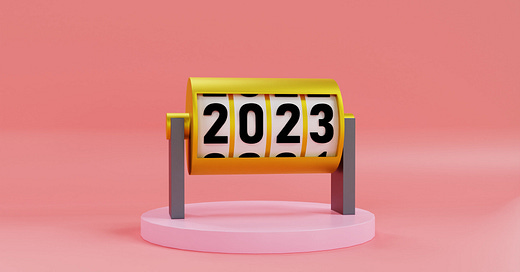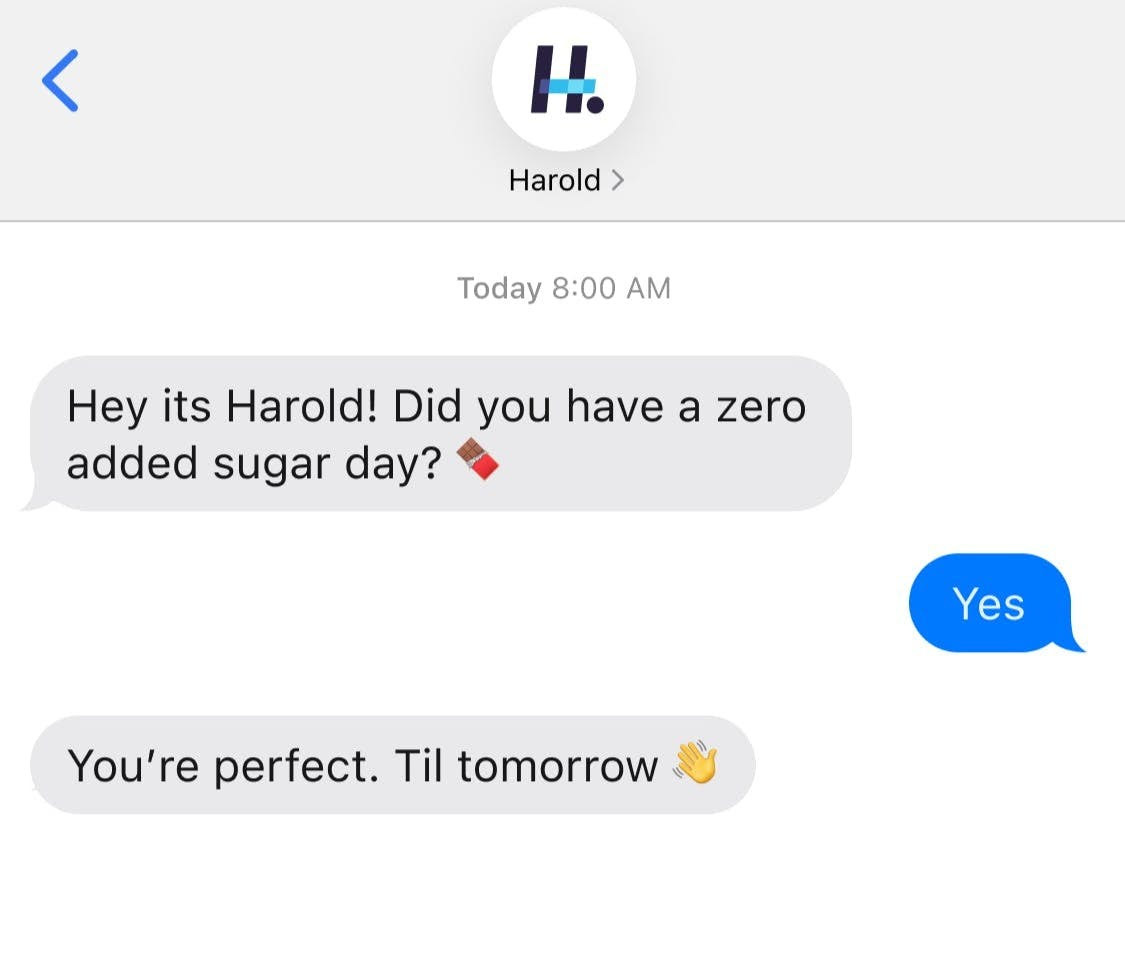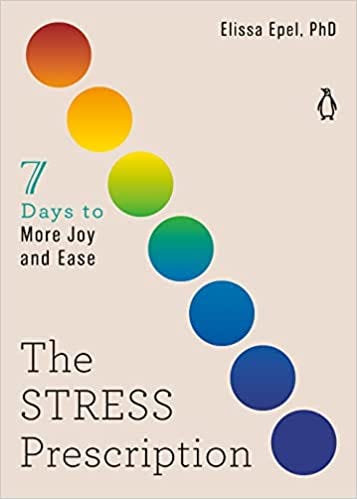🎊 New Studies Reveal The #1 Rule of Habits
3 Evidence-Based Insights for Successful Habit Formation in 2023
Welcome to Super Self, the newsletter that breaks down the latest scientific studies to help you live and work smarter.
Did a smart friend with a knack for finding the best stuff send this your way? Give ‘em a virtual high-five and then hop aboard!
Ah, The New Year.
A time when Google searches for diets and gym memberships skyrocket.
But you’ve heard the stats.
It won’t be long before the average person falls off the behavior change wagon.
Why? Because there’s still a huge mismatch between the approach that people use and the one that science tells us actually works.
It’s a knowledge gap that got even wider at the end of 2022 as multiple new studies about habit change were published.
But the good news is that your past self subscribed to this newsletter.
So, unlike most people, you’re starting 2023 with the latest and greatest research on habit change.
Smart move, old you.
Here are 3 insights from new studies to kick your year off.
P.s. You may notice things look a tiny bit different around here today as we’ve moved over to the Substack platform. You shouldn’t notice anything major beyond a few cosmetic changes, although please let me know if you see something awry. The move is simply about unlocking faster growth so I can invest even more time toward helping you achieve your goals!
FEATURED SCIENCE
3 New Insights from Habit Science for a Successful 2023
Let’s start with some motivation to stick to those new resolutions.
Habits matter. A lot.
You’ve probably heard of “flow”: the deep state of focus associated with peak performance, the world falling away, and time flying by.
But people vary a great deal in the amount of flow they experience throughout the day.
A brand new study suggests that lifestyle habits go a long way in explaining this difference.
Researchers studied the dietary, fitness, and sleep habits of hundreds of participants.
They found that these 3 central habits—sleep, diet, and exercise—were associated with major differences in how often people experienced flow and lapses of attention.
When they looked at the difference between people’s ability to focus, lifestyle habits explained up to 34% of the variance.
In other words, out of all the factors that explain why one person can focus relative to another, sleep, diet, and exercise can make up to one third of the difference!
All three habits contributed a significant role but the largest effect was from sleep.
This study reveals the link between habits and attention, but of course our habits impact many more areas of life, including energy, longevity, and mood.
So, how do you change them?
Context is king
What is the #1 predictor of successful habit formation?
Two new studies separately arrived at the exact same conclusion when they tried to get participants to eat more fruit and vegetables:
Context stability.
What does that mean exactly?
Well, let’s say you have a habit of meditating every morning after a cup of coffee.
The context that surrounds this habit consists of a whole bunch of cues: the time of day (morning), your location (maybe your living room), the action that happened beforehand (the coffee).
“After my morning coffee” would be an incredibly stable context because there are so many cues that stay the same day after day.
Both studies found that participants whose context stayed the same were the most likely to form their habits.
Those who decided to eat fruit at the same time—like after breakfast, specifically—were the most likely to form a habit.
Those who had dinner in the most stable contexts—with the same people, in the same place, at the same time—were more likely to build their vegetable eating habit.
These findings suggest the most important thing you can do when you’re first building a habit is to determine the context in which it’ll take place and make sure that context changes as little as possible.
The tool that researchers used to help participants achieve context stability was to have them complete an “implementation intention.”
It’s a simple sentence that takes a few seconds to write down and outlines the action you’re planning to take along with all of the relevant context cues that take place around it.
A template might look something like this:
I will [NEW HABIT] at [TIME] in [LOCATION] after [ACTION] with [PERSON].
Not all of these factors will be relevant to your habit so pick as many that apply and tweak the language as needed.
Maybe yours will even include additional cues like an emotion—when I feel [EMOTION]. E.g. hungry, stressed, motivated, etc.
My morning writing habit would look something like this:
I will [go to the coffee shop to write] in the [morning] at [my favorite coffee shop] after [I finish my first coffee].
(Yes, my writing is fueled by a double does of caffeine)
Turning up to the same coffee shop every day—at the same time—after doing the same thing—provides an incredibly stable context to build a habit.
It doesn’t involve other people and it happens regardless of how I feel so there’s no need to specify those cues in my implementation intention.
Writing your implementation intentions down is a forcing function to make sure you’ve established a crystal clear context. It seems to be the most important step according to the latest research for making sure your new behavior sticks around.
Some nuance: Over time, as your habit strengthens, the context becomes less important.
For example, you may find yourself eating vegetables at lunch as well as, or instead of, at dinner. A true habit will eventually become less dependent on context and some flexibility is actually a sign of a strong habit.
The studies identified three additional factors that can contribute to your success:
Obstacle planning: participants also completed a series of “if-then” statements to anticipate obstacles ahead of time. For example, if I’m eating out at a restaurant instead of cooking at home then I will order a side of vegetables.
Habit tracking: keeping track of progress also proved helpful. Participants in the vegetable study had to send a photo of their dinner plate to a WhatsApp group each night. They also received a text at 8:30 p.m. with a survey, to be completed by 11 p.m.
(I’d be remiss if I didn’t point out that our SMS habit-tracking sponsor, Harold, works exactly in this way!)Reward: previous studies have found making your habits enjoyable will speed up the association between your context and your habit—leading to faster habit formation. Participants were advised to make their food as tasty as possible and prepare it in a satisfying way.
(note: as with context, reward becomes less relevant over time. Once a habit is formed, we tend to not care if the reward is occasionally absent.)
Okay, but what about breaking habits?
Bait-and-switch your bad habits
Sabine Sonnentag is one of the most prolific organizational psychologists in the world.
In one of her recent studies, Sabine and her colleagues went in search of techniques for breaking bad workplace habits.
The findings were similar to those above but with a twist.
As habits gets stronger, they become increasingly “mindless.”
They happen almost without us even noticing.
So the key to weakening a habit is to become highly aware of it.
Awareness is to bad habits as daylight is to vampires.
As such, consistent habit tracking (or as the study put it: “vigilant monitoring”) was one the most effective strategies to decrease the strength of bad habits over time.
A similar effect has been observed in studies of weight loss with successful participants reporting that simply logging their food intake is one of the most important tools. The awareness slows down their maladaptive patterns.
Once again, writing implementation intentions proved highly effective for breaking bad habits.
The only difference is that you need to specify which new habit you will be replacing your old one with.
Studies have consistently shown that the best way to break a habit is to replace the behavior with a different one.
Especially if you can’t avoid the cues:
Instead of consuming a sugary drink, have some fruit tea.
Instead of scrolling through TikTok before bed, listen to a podcast or read some fiction.
Instead of yelling at your cat, do some yogic meditation.
Just be sure to specify what you’ll do differently the next time a craving arises.
💎 The Takeaway
The final piece of advice from these studies is to just focus on doing the reps.
The whole point of the above strategies is to get you to do your habits long enough for them to become automatic.
The hardest part is at the beginning, but with enough repetitions, your entire brain structure will reorganize itself to make your habit much more effortless.
And with that, here’s to your best year yet 🥂
Summary:
Perform new habits in a stable context
Write out an implementation intention
Think of how to make your habit enjoyable
Use a habit tracker when you’re starting out (especially for bad habits)
Specify an alternative action when breaking a bad habit (especially if you can’t avoid the context)
SUPER SNIPPETS
🌤 Light Sleepers—Exposing yourself to more sunlight during the day, even in winter, will help you fall asleep earlier. That’s according to a new study that monitored the sleep and light exposure of 507 undergraduate students in Seattle over three years. Each additional hour of daylight exposure pushed the students’ circadian rhythm forward by 30 minutes. Exposure to indoor light during the evening had the opposite effect, causing students to fall asleep later (15 minutes later for each hour of artificial evening light).
⌚️ That Was Fast—A new randomized control trial found that 3 months of intermittent fasting had a pronounced effect on participants with type 2 diabetes.
Almost 90% reduced their medication intake following the intervention along with 47% experiencing a remission of their condition. Only 2% achieved the latter outcome in the control group. Of those who achieved remission, 65% had been living with diabetes for over 6 years.
The intermittent fasting group lost almost 6kg of weight compared to 0.27 kg in the control group, and they reduced the cost of their medication by 77% more.
🎊 The Science of Parties—researchers just gave us all the more reason to celebrate by revealing the scientific benefits of social gatherings. A good ol’ get-together can boost our sense of social support, which in turn, is associated with health and well-being, increased life-span, decreased anxiety and depression, and a virtuous cycle of prosocial behavior. The only catch is that your party must satisfy the following 3 criteria:
There has to be food and drink
You must be recognizing an individual’s positive life event
People have to turn up / there must be socializing (duh)
Partying = self-care. It’s confirmed. 🥳
🚴♂️ Myokines—Previous research has found that exercise can alter the chemical environment of our bodies in a way that suppresses cancer growth. A new study published in Nature Journal adds to this research by finding that exercise stimulates the release of anti-cancer proteins known as “myokines.” Men with prostate cancer produced enough myokines to suppress cancer cell growth by 17% after 34 minutes of high intensity exercise on a stationary bike.
(4 minutes of high intensity followed by 2 minutes of low intensity for 6 rounds + warm up and cool down).
💊 Supplements for Her — Women are the largest consumers of dietary supplements, yet research is lacking on the differences between how men and women respond. Fortunately, Abbie Smith-Ryan, a professor of exercise physiology, put together an amazing review summarizing the science that applies exclusively to women.
The three supplements with the most evidence behind them are:
Caffeine for energy and fatigue—3-9mg/kg
Omega 3 for mental health—1-3g daily
Vitamin D for general health—600 IU per day for ages 13-70 / 800 IU for 70+*
*best consumed with a serving of healthy fats
The full paper contains a ton of additional information but here’s a graphic covering the highlights:
Meanwhile...
🍫 The Dark Side—multiple studies have found positive effects of consuming dark chocolate and the cocoa it contains. But a new Consumer Reports test found that some brands may have harmful levels of heavy metals.
📚 Book Smart—an amazing list of behavioral science books published in 2022.
🫥 Social Disconnect—A new study published in Nature found experiencing a traumatic social event can cause the brain to rewire so that social experiences are no longer rewarding.
🩸 Red Alert—Another study published in Nature links a common red food dye known as Allura, found in candies, soft drinks, dairy products and some cereals, with IBS.
🧪 SOBA—Researchers developed a new test to detect Alzheimer’s several years earlier.
🥗 Eating for Two—Evidence that an anti-inflammatory Mediterranean diet boosts fertility in men and women continues to grow.
🔗 The Liver Link —


Today's newsletter is brought to you by Harold the Habit Tracker
2023: The Year You Take Control of Your Habits
Habit tracking can improve your mental health and motivation.
A 2020 study found that students who tracked their study habits for 6 weeks:
were less likely to experience a bad mood or feel distracted while studying;
were less likely to wish they were doing something more enjoyable, and;
were more motivated to study and displayed stronger study habits.
The problem is that tracking your habits... is a habit in and of itself.
Most apps, templates, and journals are a pain to keep up with and quickly fall by the wayside.
Harold solves this problem by meeting you where you are: in your inbox.
It's the easiest way to track habits ever created!
(I'm currently using Harold myself to consume less added sugar 🍫)
Start tracking today and stick to those New Year's Resolutions for good.
NEW & NOTEWORTHY CONTENT
📖 [SUCCESS] — All Success Is A Lagging Indicator — Ryan Holiday
Nothing comes from nowhere. Not success. Not inspiration. Not the muses. Not writer’s block. Everything is a lagging indicator. Of whether or not you did the work.
4 minute read
📖 [PLANNING] — The Annual Planning Guide — The Curiosity Chronicle
It’s not too late to make an annual plan. If you’re looking for a great template, Sahil Bloom shared his simple 6-step planning process in his final deep dive of 2022.
6 minute read
🎙 [HABITS] — Habits That’ll Help You Not Waste Another Year Of Your Life w/ James Clear — The School of Greatness
James Clear (author of Atomic Habits) shares the questions and mental models that have helped him achieve his goals and deal with life’s challenges, along with his latest thoughts on habit change.
60 minute listen
🎙 [CREATIVITY] — The Science of Creativity & How to Enhance Creative Innovation — The Huberman Lab Podcast
Professor Andrew Huberman argues that creativity is a skill that can be developed and improved. This episode breaks some long-held creativity myths and offers several evidence-based tools for tapping into your creative side.
2 hour listen
💡 Did you hear, read, or watch some inspiring content published in the last two weeks relevant to personal growth? Help me improve this section for everyone by letting me know!
LATEST BOOK RELEASE
The Stress Prescription: Seven Days to More Joy and Ease
by by Elissa Epel, PhD
“A preeminent expert sheds light on how to handle the daily hassles of life. It’s not just a manual for managing stress—it’s a toolkit for preventing it.” —Adam Grant, #1 New York Times bestselling author of Think Again
From world-renowned psychologist and New York Times–bestselling author Dr. Elissa Epel, a simple yet powerful plan to turn your stress into your strength in just seven days
In The Stress Prescription, Dr. Epel distills decades of research, infused with wisdom, into a practical yet transformative seven-day plan of science-based techniques that can help you harness stress through more positive challenge and purpose.
Day 1: Things Will Go Wrong . . . And That’s All Right
Day 2: Control What You Can . . . And Put Down the Rest
Day 3: Be the Lion
Day 4: Train for Resilience
Day 5: Let Nature Do the Work
Day 6: Don’t Just Relax . . . Restore
Day 7: Start Full, End Full
QUOTE OF THE WEEK
“Could the young but realize how soon they will become mere walking bundles of habits, they would give more heed to their conduct while in the plastic state. We are spinning our own fates, good or evil, and never to be undone.”
― William James
It’s only day #3, but I hope you’re already taking this year by storm!
Lewis 🦸🏻♂️
P.s. I've heard that forwarding this issue to a friend who might enjoy it will give you seven years of good karma. Who knows, worth a shot?









